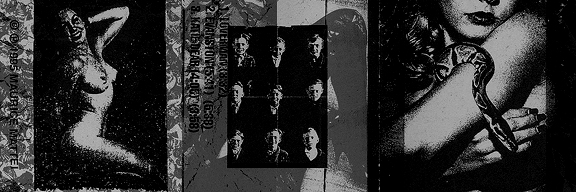In the end, I broke it off with Sandra (see chapters 3 & 4) and left for Italy to join my parents and family for a few weeks. Although street smart, she had gotten close to being busted a few times and this might have played a part in me coming to my senses. By that time – the Spring of 1992 – I had written enough material to put together a record. I started working out the sequencing of the songs while on my trip. Strangely enough, I didn’t feel much regret or sadness about leaving Sandra. There was only a sense of accomplishment at having gotten out of a very dicey situation relatively unscathed, or so it seemed.
I arranged studio time after returning from Italy. My idea was to do a straight live, in-studio acoustic recording with the intention of making it as stark as the subject matter in the songs. Having never performed for an audience of any significant size or recorded a single thing since the mid-’80s didn’t come into consideration. It was the not so unusual scenario of a wanna-be who plays guitar and sings in his bedroom and yet somehow thinks his lack of musical experience will magically translate into a thing of value. This assumption was soon to be corrected.
What was initially conceived as a simple project that might take a couple of weeks to finish turned into a three-year ordeal. After listening to the first sessions I realized that nearly everything was wrong. My timing was consistently off. Some of the songs ran to over five minutes and they all began at one tempo and finished at another. The vocals were horrid. Aside from pitch issues, attempts at emoting were self-conscious and unconvincing. Additionally, there was the problem of my guitar-playing. I used a cheap Yamaha that didn’t have much character or presence and my less-than-accomplished musicianship only compounded the instrument’s shortcomings.
Doing 30, 40, at times 50 takes of some songs became a regular event. Listening to playbacks was torturous. Every time it seemed that progress was being made, an acceptable take refused to come together. The sessions dragged on and, years after the recording was completed, I came to realize that this is where my understanding of how to make and perform music began. It was an expensive but effective lesson. I also started to get a grasp of what constitutes a good song. Many of the first compositions written for this recording were weak in comparison to the handful I came up with as things started to wind down. The best songs – such as Lover Man, Widow’s Walk, Black Tie Affair, and It’s Too Late (To Say I Told You So) – were all written in the final months of the project.

Grandview CD
Another dose of reality came when the CD, entitled Grandview, was released. I distributed advance copies to the local press. The Willow, a regional Indie publication, gave it a good review and named it among the year’s top releases. It reached to No. 11 out of a field of 50 – a far less notable achievement than you might think. Lawrence Rent, the music columnist for a local newspaper, thought it sounded like a demo and didn’t believe it warranted any “ink,” as he put it. He said he’d had high hopes because of the lovely sleeve design but was disappointed with the contents. The most interesting aspect of all this, however, was the reaction of people I knew. I came to understand two things about putting your work out into the public arena: The first was that your friends will seldom tell you what they really think. Secondly, people justifiably do not take a self-produced recording seriously and will only give it a cursory listen – if, that is, they listen to it at all.
While some might have found these circumstances disheartening, I felt liberated. Perhaps I should have taken the hint and moved on to a less flighty medium, but the lack of validation, the tactful dismissals, and the public apathy only allowed me to be much less tentative in my writing and recording. This isn’t meant to imply that I didn’t care about the quality of my work. It means that I no longer put as much value in what the majority of other people thought of my work.
<<< Continue reading >>>
<<< Read the previous chapter
© 2013 by Maurice Mattei
All rights reserved.